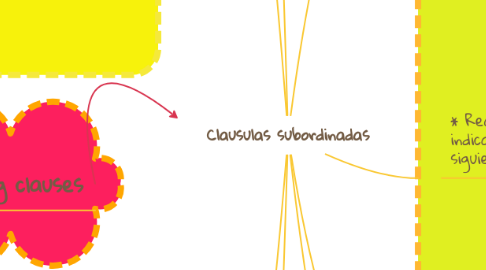
1. As I was walking down the street, I saw When / as = cuando my ex-boyfriend. - I’ll phone you when I know the answer While = mientras (que) - While I was watching TV, the telephone rang. As soon as = tan - I’ll phone you as soon as I know the answer. pronto como - As soon as he had finished studying, he left. - The train had left before they got to the Before / after = antes de (que) station / después de (que) - She went to the gym after she had done her homework. Until = hasta (que) - We were waiting until she arrived
2. Las clausulas subordinadas son libremente formadas por una clausula principal, una conjunción subordinada y una clausula dependiente. En inglés hay diferentes conjunciones y adverbios que indican razón, propósito, resultado de algo, tiempo, contraste.
3. * Reason (Razón) .- Podemos indicar la causa mediante los siguientes nexos:
3.1. Because = porque Because of = por, debido a La diferencia entre ambos nexos es que el primero va seguido de una oración (con sujeto y verbo) y el segundo va seguido de nombre. BECAUSE + CLAUSE We moved to another city because my father got a new job. BECAUSE OF + NOUN We moved to another city because of my father’s new job. As /since = como, puesto que. - As it is your birthday, I’ll lend you my best clothes. Normalmente van al principio de la frase Otros nexos causales: due to, owing to = debido a
4. * Purpose (Propósito).- Con este tipo de oraciones expresamos la finalidad, el por qué alguien hace algo. La traducción de todos los nexos va a ser siempre ‘para’. Los nexos y sus usos son:
4.1. To + infinitivo - I went to the university to talk to one of my teachers. In order to / - I went to the university in order to talk to one of my so as to teachers. (more formal)
4.2. To + infinitivo - I went to the university to talk to one of my teachers. In order to / - I went to the university in order to talk to one of my so as to teachers. (more formal)
4.2.1. Nota: 1. En frases negativas, se emplea generalmente in order not to /so as not to (no not to sólo): - I hurried so as not to miss the bus. 2. Este tipo de nexo sólo se usa cuando el sujeto del verbo y el del infinitivo es el mismo. So that + can(n’t) /will (won’t) → para referirnos al presente o futuro + would(n’t) / could(n’t) → para referirnos al pasado Ejemplos: - I’ll buy a ball so that we can play football. = Compraré un balón para que podamos jugar al fútbol. - Get a map with you so that you won’t get lost. = Coge un mapa para no perderte. - I bought a ball so that we could play football = Compré un balón para que pudiésemos jugar al fútbol. - We got a map with us so that we wouldn’t get lost = Cogimos un mapa para no perdernos. For + noun / -ing form - A knife is used for cutting In case significa por si acaso In case + present → para referirse al presente + past → para referirse al pasado Ejemplos: - I will take an umbrella in case it rains. - We bought an extra ticket in case Martin wanted to join us.
